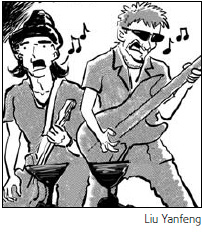It surprised me to hear my friend Katie complain about Hong Kong. "People here don't read," she said, "they only care about money and shopping." I was drinking with Katie and her two friends at a small bar hidden in a side alley off Hollywood Boulevard. All three were born in Hong Kong but grew up in Canada.
"It's true," Katie's friend Nancy chimed in. "Look at how many bookstores we have in Hong Kong."
It was surprising to hear Hong Kong residents stereotyping the city. Hong Kong had not been a city easy for me to like. When I first visited in 1993, it felt like the concoction of a dream - where people looked the same as me and yet we couldn't communicate. Back then, few Hong Kongers spoke Mandarin, except for the assistants at jewelry shops catering to mainland tourists. And the streets were overrun by luxury brands, quite intimidating for a country bumpkin from Sichuan.
In the past five years, I have visited Hong Kong often to see my sister who works there. The city has gradually grown on me. The streets are clean, the skyline from the ferryboat breathtaking, and the city's rhythm intense but orderly. Pedestrians do not jaywalk, some insist on helping when you look lost in the street, moreover, they have all learned to speak Mandarin!
Whenever my friends disparage Hong Kong as a cultural wasteland, I rise to its defense. If we define culture not as an accumulation of ancient books, but as common attitudes and behavioral norms shared by the population, then Hong Kong has a lot going for it.
Yet I was there, feeling uneasy about these Hong Kong friends looking down on their hometown.
Katie took a sip of her white wine with lychee and sighed. "I miss Beijing," she said, "It's a lot more interesting up there." Katie had lived in Beijing for two years before moving back to Hong Kong a year ago. "Bars in Beijing are more interesting. People there too. Too many expats in Hong Kong who binge on alcohol and parties."
I thought of the chaotically dense population in Mong Kok that gave me a headache each time I visited there. There are 7 million people in Hong Kong, and there must be 7 million personalities, dreams and passions. How can we brush them aside in one broad stroke? Despite the seeming material monotony in Central, Hong Kong has an impressive efficiency and diversity.
There are 7 million people in Hong Kong, and there must be 7 million personalities, dreams and passions. How can we brush them aside in one broad stroke? Despite the seeming material monotony in Central, Hong Kong has an impressive efficiency and diversity.
But I did not try to convince my young friends. Perhaps Beijing has indeed overtaken Hong Kong as the hip destination in Asia? Or perhaps they were too young, and have migrated too much, to appreciate the people in Mong Kok busy with their livelihoods?
We moved to a hip gallery for a small indie concert of two rock bands and one disco-punk band. It took me a while to figure out what was disorienting - the audience was hip, sophisticated and well dressed and the bands sang in English. A music critic explained to me that all the band members had decent day jobs in the office; they only played for fun in their spare time.
That contrast made me miss Beijing all of a sudden. In Beijing such concerts would happen in dark rundown venues, and the audience would consist of eager locals and expats in shabby clothes. In Beijing rock musicians would be starving and live in dilapidated apartments far from the city center. In Beijing the people on and off stage seem to be hungrier to go somewhere.
I was tempted to agree with Katie, that Beijing is more interesting and more alive than Hong Kong. Then I saw the lead singer on stage, singing his heart out.
Every city has its own music, I reminded myself, just as every city has its own soul.
(China Daily July 30, 2009)